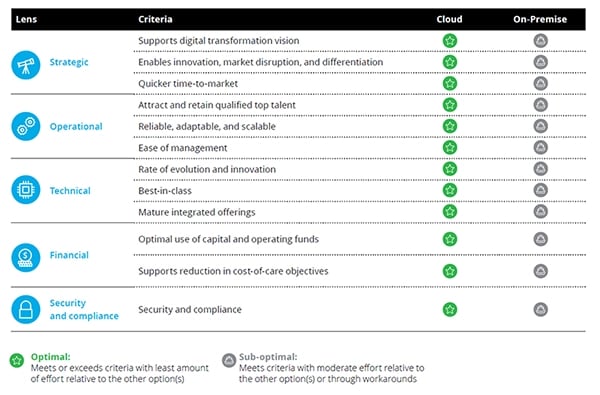
Healthcare Industry Trends: Digital Health, Cloud and Data Analytics
Healthcare organizations are investing in digital transformation and hybrid IT, but some experts say they need to step up the pace. Read about healthcare industry trends that are shaping healthcare decisions and why colocation plays a key role.

Source: Deloitte
Large version of chart.
Digital transformation is underway in nearly all healthcare organizations. Is it happening fast enough? A 2023 Huron consulting group healthcare digital maturity assessment puts 32% of organizations at low maturity, 47% at medium maturity and only 21% at high maturity.1
Modernization can help healthcare and life sciences organizations accelerate transformation and achieve three critical outcomes identified by respondents to a recent Salesforce survey:2
- Creating efficiencies and reducing costs (79%)
- Improving consumer trust and satisfaction (73%)
- Improving business functions across the organization (72%)
Given what’s at stake, speed matters. Healthcare organizations are implementing hybrid IT, especially cloud and colocation in response. To understand exactly why, read about trends and their implications for infrastructure, operations and patient care.
What’s Ahead for Healthcare?
Healthcare industry trends point to fundamental, broad changes in technology, operations and culture. Organizations can’t afford to be part of the 60% of respondents who report using between 50 and 500 “point solutions” (applications) to manage healthcare operations – a situation that 88% of respondents said was creating stress and burnout, lost opportunities for cost savings and challenges to patient care.3
Trend No. 1. Digital Health
Digital health initiatives use technology in modern, innovative ways. Initiatives include mobile health (mHealth), wearable devices, telemedicine and health information management (HIM). For many organizations, digital health involves a move from point solutions to platforms, which are cost-effective and efficient. By connecting and integrating applications, platforms simplify operations as well as patient and consumer access to information.
Trend No. 2. Cloud Adoption
Organizations that have adopted cloud are seeing excellent outcomes. For example, a PwC study reports that 50% or more of health services executives note measurable increased agility, enhanced stakeholder trust, greater profitability, higher productivity, enhanced customer experience and improved decision-making.4
To adopt or not to adopt? The debates continue. But according to Deloitte, there’s no downside to cloud adoption. We suggest you consider healthcare-specific solutions, such as AWS Industry Quest, Microsoft Cloud for Healthcare, Oracle Cloud Infrastructure for Healthcare and IBM Cloud, to streamline adoption and relieve migration pain.
Trend No. 3. Data Analytics
Most organizations today, in all industries, aspire to be data-driven. Artificial intelligence (AI), particularly in the form of machine learning (ML), produces insights into many business functions. Automation puts the insights (sometimes called inferences) to use. Predictive analytics are already improving workflow processes, clinical decisions, patient care, patient experience and profitability. Analysis of clinical data and medical records, for example, can identify cost-saving treatments, or patients who are at risk for certain conditions.
Although there is a rush to AI, a cautious approach seems sensible. Decisions about AI involve ethics, technology, risk tolerance, security and regulations – and of course, data management. You need solutions for gathering, storing, integrating, analyzing, moving and protecting data. Few organizations choose DIY application development because so many cloud-based solutions already exist.
Consult with a Hybrid IT Specialist
Hybrid IT offers a mix of environments, such as on-premises, colocation and various types of cloud. The mix allows you to place workloads and applications in the environment that best matches your requirements. Colocation is a growing part of hybrid IT because it can accelerate digital transformation and help you achieve critical outcomes sooner.
From your colocation site, you can quickly, easily and securely connect to:
- Platform solutions that support patient portals and offer content delivery networks to distribute healthcare education and information
- Public cloud service providers via direct connection so you can bypass the internet
- Private, automated connectivity that delivers low latency, reliable digital health services
- Other companies that provide private cloud, SaaS offerings such as data analytics, systems integration, managed services and more – many of these companies have healthcare-specific capabilities
- A network-rich environment that allows you to integrate on-premises, colocation and cloud
CoreSite experts follow a collaborative process to help you define and implement a customized hybrid IT solution that delivers measurable benefits immediately. Our modern, compliant data centers offer 100% SLA-based uptime and interconnection capabilities.
Also, keep an eye out for more insights on healthcare trends and how to prepare for the future from CoreSite.
References
1. Orchestrating Healthcare’s Digital Future, Huron Consulting Group (source)
2. Healthcare and Life Sciences Organizations Across the Globe Are Looking to Lower Costs, Salesforce (source)
3. Accelerating Digital Transformation in Healthcare, Grant Thornton (source)
4. Most Health Services Organizations Are in the Cloud, but Far Fewer Have Found the Silver Lining, PwC (source)










